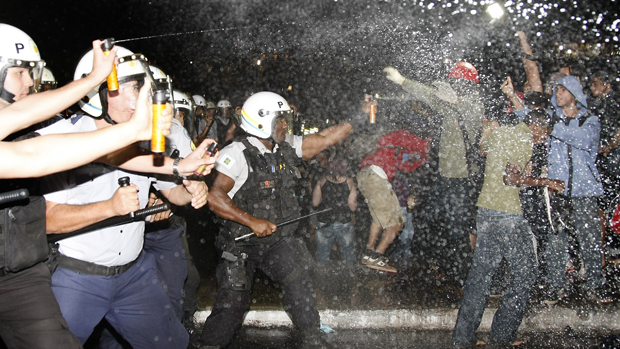Brazil: Confederations Cup in danger as a million protest
World Cup warm-up tournament could be under threat as protesters' agenda widens

A free daily email with the biggest news stories of the day – and the best features from TheWeek.com
You are now subscribed
Your newsletter sign-up was successful
MORE THAN a million people are said to have taken part in the latest wave of protests in cities across Brazil as anger over corruption and the cost of staging the World Cup spreads.
President Dilma Rousseff has cancelled a trip to Japan and called an emergency cabinet meeting in order to deal with the situation, amid reports that the Confederations Cup, a World Cup test event featuring several top footballing nations, could be called off.
"Respected, mainstream media, are carrying reports speculating that the eight-team tournament... is in danger," reports the Daily Telegraph. It quotes Brazilian newspaper Estado de Sao Paulo, which says "Fifa is negotiating with the teams to try and persuade them to stay".
The Week
Escape your echo chamber. Get the facts behind the news, plus analysis from multiple perspectives.

Sign up for The Week's Free Newsletters
From our morning news briefing to a weekly Good News Newsletter, get the best of The Week delivered directly to your inbox.
From our morning news briefing to a weekly Good News Newsletter, get the best of The Week delivered directly to your inbox.
The protests began last week, sparked by anger over the high cost of public transport, but the demonstrations have also highlighted concerns about corruption and the cost of next year's World Cup.
Better education and health services are among the protestors' ''very broad'' demands, according to Gary Duffy of the BBC. "A sluggish economy and inflation that is affecting the lives of ordinary Brazilians every day can be added to the mix,'' he says.
"Politicians with high salaries giving jobs and flights to relatives are widely scorned. Inequality and the huge cost of hosting the World Cup and the Olympics are key issues raised by demonstrators alongside corruption, crime and police brutality."
Violence erupted at many of the rallies on Thursday, when an 18-year-old man died after a car drove through a barricade in Sao Paolo.
A free daily email with the biggest news stories of the day – and the best features from TheWeek.com
The biggest demonstration took place in Rio, where as many as 300,000 people took to the streets.
The Guardian explains that the protesters have "reached the limit of their tolerance about longstanding problems that the Confederations Cup and World Cup have brought into focus because of the billions of reals (Brazil's currency) spent on new stadiums".
Initially the protests were peaceful, reports the paper. "But later protesters pulled down security cameras, smashed bus stops and torched cars. Every hoarding that advertised the Confederations Cup was destroyed,'' it adds.
Police responded with pepper spray and rubber bullets. More protests are planned for the weekend.